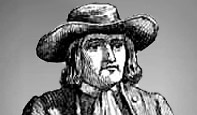Indeed science is, or ought to be, the accurate and truthful measurement of Nature. Whereas in religion, intolerance of dissenting opinion has generally been the norm from Paul’s Epistles onwards. And from the Council of Nicea onwards, persecution! The unpleasant truth is that there has been no systematic pursuit of truth in religion, as there has in science. A pursuit of orthodoxy maybe; but that is the path of fashionable error. Nowadays if religion invited us to prefer the opinions of Jesus to those of Ptolemy, Newton and Einstein, most intelligent people would think religion absurd. Yet in the 19th century, evolution, the second great scientific thought, was opposed with passionate and diabolical fury. It was a repetition of the opposition to Galileo.
Galileo discovered with his telescope that the planet Jupiter had moons; but the Jesuits of the Inquisition refused to look down his telescope to see if there were any moons. They knew better; they knew there were only seven planets, because they knew seven was the perfect number; so there could not be any moons, as that would add to the number seven. And Galileo was prosecuted for heresy; and told bluntly to tell the “Truth” or face torture. They meant, admit that Copernicus was wrong, and that their Biblical version of astronomy was correct, or face torture. Today anyone can see they were ignorant bigots, though I think devilish perverters of the truth might be nearer the mark; but it cannot have been so obvious at the time, because their like are still around today in all walks of life. Nor was it obvious to the 19th century clerics who refused to accept so vehemently the proof of evolution (in terms of fossil remains) and its consequences. But the consequence of disputing one profound truth of science after another and losing, is that you yourself lose respect. Science needs inspiration as well as inductive reasoning; inspiration has only one source; and maybe science is God’s gift to man, as Jesus was. Indeed God may have inspired scientific discovery as the way to overcome the dishonesty, corruption and intolerance of the Church, which faced Him and obstructed his plans at the end of the Middle Ages. So He had to get rid of the obstruction: just as He had to get rid of the dinosaurs! When the experience of Erasmus and Luther showed that it was impossible to reform the Church from within, and that the only reform was by schism, God may have decided that He would outmanoeuvre all the Churches, and through the agency of science show how limited was the idea of Salvation, which all Churches held. Science may be God’s gift to man, as Jesus was.
Yet science remains the chief stumbling block to accepting the teaching of Jesus. He knew nothing of science; though science has not only swept away the foundations of Plato’s philosophy, it has swept away the foundations of the Church’s theology, which since Augustine has been based on Plato. Sixty years ago Bertrand Russell was saying that Plato’s philosophy was based on fundamental ideas about space, time and matter, which modern atomic physics had shown were fundamentally flawed. As Bertrand Russell was a good deal more sympathetic to Plato than he was to Aristotle, I am prepared to accept he knew what he was talking about. Certainly science has disposed of Plato’s belief that you can construct a world of ideal forms and certain truth on a basis of logic alone. You need to experiment, with X-ray diffraction patterns, to discover the form crystal structure takes. Logic gets you nowhere. We realize now that the conclusions to which reasoning leads are only as valid as the assumptions on which that reasoning is based. Reasoning depends on its parameters, just as mathematics depends on its axioms, and science depends on its basic assumptions.
Science has proved to a high degree of probability that in a period of countless ages matter or star-dust has evolved into us. The idea of evolution is as dramatic a change in our thinking as that which followed the publication of Newton’s Principia, which showed that the Universe when viewed on a grand scale is ordered. Evolution is linked with the name of Darwin; but the idea was current long before Darwin, only he brought an overwhelming mass of evidence to support it. As regards evolution, it does not matter whether the mechanism of evolution is natural selection or survival of the fittest, nor even if it consists of 1001 acts of creation along the way; it is still evolution! The fact is star-dust evolved into us.
